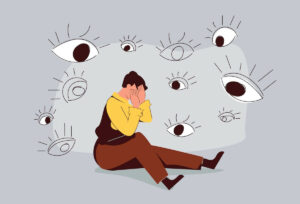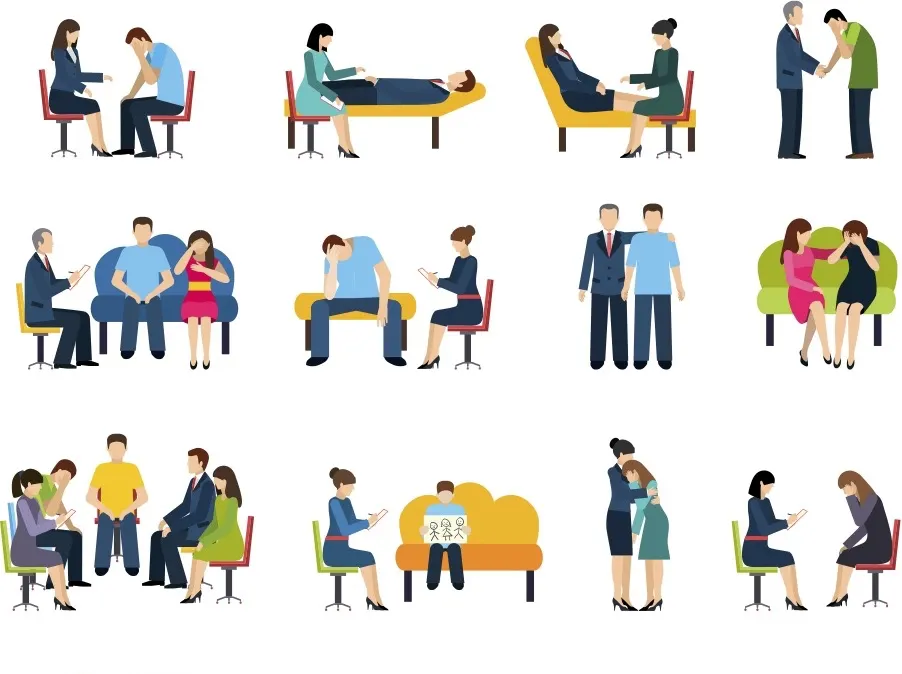There are many different types of therapy available, and it can be difficult to decide which one is right for you. In this blog post, we will discuss the 15 most common types of therapy and provide a brief overview of each one. We will also talk about what makes each type of therapy unique and how it can benefit you. If you are considering seeking treatment for a mental health condition, this information will help you make an informed decision about which type of therapy is right for you!
Contents
- 1 Top 15 Types Of Therapy
- 1.1 Psychodynamic therapy
- 1.2 Gestalt therapy
- 1.3 Mindfulness-Based Interventions
- 1.4 Cognitive behavioral therapy
- 1.5 Interpersonal therapy
- 1.6 Exposure therapy
- 1.7 Group therapy
- 1.8 Expressive art therapy
- 1.9 Play therapy
- 1.10 Clinical hypnotherapy
- 1.11 Solution-focused brief therapy
- 1.12 Body Psychotherapy
- 1.13 Animal-assisted therapy
- 1.14 Sensorimotor psychotherapy
- 1.15 Neuro-linguistic programming
- 2 Choosing The Right Type Of Therapy For Yourself
- 3 Conclusion
Top 15 Types Of Therapy
 Simply put, therapy is the process of treating a mental health condition by talking to a trained professional. The main goal of therapy is to help you understand and manage your thoughts, feelings, and behaviors in a healthy way. There are many different types of therapy available. Each type has its own unique benefits and drawbacks. However, they all share the common goal of helping you improve your mental health. In this section, we will briefly discuss the 15 most common types of therapy.
Simply put, therapy is the process of treating a mental health condition by talking to a trained professional. The main goal of therapy is to help you understand and manage your thoughts, feelings, and behaviors in a healthy way. There are many different types of therapy available. Each type has its own unique benefits and drawbacks. However, they all share the common goal of helping you improve your mental health. In this section, we will briefly discuss the 15 most common types of therapy.
Psychodynamic therapy
Perhaps the oldest and most widely known type of therapy, psychodynamic therapy is based on the work of Sigmund Freud. This type of therapy focuses on understanding the unconscious mind and resolving past trauma. It is typically conducted in a one-on-one setting with a therapist.
The main focus of psychodynamic therapy is to help you understand the underlying causes of your mental health condition. This type of therapy can be very helpful for people who have experienced trauma or who have difficulty processing their emotions.
For example, if you have anxiety, your therapist may help you understand how your early childhood experiences are impacting your current anxiety. This type of insight can be very helpful in managing your anxiety and improving your overall mental health. It majorly works well for people who have issues with trust, anger management problems, or tend to be perfectionists. It can also help with mild to moderate disorders like depression and anxiety.
Gestalt therapy
One of the more unique types of therapy, gestalt therapy is based on the principle that we are all whole beings. This type of therapy focuses on helping you become more aware of your thoughts, feelings, and behaviors. It also emphasizes the importance of being present in the moment.
Gestalt therapy is typically conducted in a one-on-one setting with a therapist. However, it can also be conducted in group settings. This type of therapy is often used to treat conditions like anxiety, depression, and addiction.
The main focus of gestalt therapy is to help you become more aware of your thoughts, feelings, and behaviors. This type of awareness can be very helpful in managing your mental health condition. For example, if you have anxiety, gestalt therapy can help you become more aware of your anxious thoughts and behaviors. This type of awareness can be very helpful in managing your anxiety and improving your overall mental health.
Gestalt therapy is a relatively new type of therapy. However, it has been shown to be very effective. In fact, research has shown that gestalt therapy is just as effective as other more established types of therapy. It caters to a large number of issues like addiction, anxiety, depression, PTSD, etc.
Mindfulness-Based Interventions
 Before understanding this approach to therapy, let us first understand what we mean by mindfulness. Mindfulness is a form of attention that is characterized by present-centeredness and nonjudgmental awareness of thoughts, feelings, and sensations. It is considered to be both a state and a trait, with the latter referring to an individual’s overall disposition or “style” of mindfulness.
Before understanding this approach to therapy, let us first understand what we mean by mindfulness. Mindfulness is a form of attention that is characterized by present-centeredness and nonjudgmental awareness of thoughts, feelings, and sensations. It is considered to be both a state and a trait, with the latter referring to an individual’s overall disposition or “style” of mindfulness.
Mindfulness-based interventions (MBIs) are a class of psychological therapies that are derived from traditional Eastern meditative practices and have been applied in a Western context. These interventions typically involve formal mindfulness training in the form of meditation, as well as informal mindfulness practices such as mindful eating or walking.
It has been shown to be effective in treating anxiety, depression, and chronic pain. The main objective of this therapy is to help you become more aware of your thoughts, feelings, and behaviors in order to better manage them. Moreover, it also contributes to developing a greater sense of self-compassion and acceptance.
Some common forms and types of mindfulness-based interventions are:
- Mindfulness-Based Stress Reduction (MBSR)
- Mindfulness-Based Cognitive Therapy (MBCT)
- Dialectical Behavior Therapy (DBT)
- Acceptance and Commitment Therapy (ACT)
MBIs are a new and exciting form of therapy that is based on mindfulness practices.
Cognitive behavioral therapy
This is perhaps the most popular, effective, and widely-taught form of therapy. CBT is based on the idea that our thoughts cause our feelings and behaviors, not external things, like people, situations, and events. The benefit of this therapy is that it can be relatively short-term (about 12-20 weeks) and can be focused on specific issues.
The main objective of CBT is to teach us how to recognize and change negative or unhelpful thoughts and behaviors. This therapy can be conducted in individual sessions or in a group setting. This means that it can be adapted to fit different budgets and schedules.
The mechanisms of this therapy work by helping us to understand how our thoughts and behaviors are interconnected. CBT has been shown to be effective in treating a variety of mental health issues, including depression, anxiety, eating disorders, substance abuse, and more.
There are various forms and types within CBT. The most popular ones include:
- Cognitive Processing Therapy
- Behavioral Therapy
- Self-Instructional Training
- Rational Emotive Behavior Therapy
- Stress management
The popularity and effectiveness of cognitive behavioral therapy have led to the development of various other forms of therapy that are based on its principles.
Interpersonal therapy
Interpersonal therapy, by the name of it, focuses on our relationships with others. This therapy is based on the idea that our relationships with others are a fundamental part of our mental health. The main goal of interpersonal therapy is to help us develop and maintain healthy relationships.
Interpersonal therapy can be helpful for those who are struggling with depression, anxiety, or even just general life stressors.
This type of therapy can help us learn how to communicate better, set boundaries, and manage conflict. If you have a hard time maintaining close relationships or find yourself in toxic relationships, interpersonal therapy may be a good option for you.
It encompasses various techniques and methods to help patients deal with their emotions, thoughts, and experiences. Some common and effective techniques of IPT include:
- Focusing on current relationships and how they are affecting your mood
- Learning to communicate better with others
- Setting boundaries in relationships
- Managing conflict in relationships
- Exploring how past relationships have influenced your current ones
IPT is usually conducted in weekly sessions that last for around 50 minutes to an hour. It is normally a short-term therapy, lasting for around 12 to 20 sessions. This type of therapy has gained popularity in recent years, and there are now many different variations of interpersonal therapy. If you’re interested in this type of therapy, be sure to ask your therapist about what specific approach they use.
Exposure therapy
 This may be the riskiest yet most effective form of therapy. It involves being exposed to the feared object or situation until the fear subsides. This can be done in a controlled environment, such as with a therapist, or in real-life situations.
This may be the riskiest yet most effective form of therapy. It involves being exposed to the feared object or situation until the fear subsides. This can be done in a controlled environment, such as with a therapist, or in real-life situations.
For example, if you’re afraid of heights, your exposure therapy may involve gradually spending more time on tall buildings or bridges until your fear subsides. This type of therapy can be very effective, but it’s important to work with a therapist you trust to ensure a safe and successful experience.
This therapy also has further subdivisions and other types within itself. Some of the more common types of exposure therapy are:
- Flooding
- Systematic desensitization
- Virtual reality therapy
- Eye movement desensitization and reprocessing (EMDR)
- Gradual exposure therapy
- In-vivo exposure therapy
- Interoceptive exposure therapy
- Imaginal exposure therapy
- Behavioral experiments
All these are the various types of therapies that come under the broad spectrum of exposure therapy. It is the most beneficial for treating anxiety disorders, but can also be used to treat other conditions such as phobias, OCD, PTSD, and more.
Group therapy
Group therapy is a modern-day phenomenon that has only grown in popularity in recent years. It is a type of therapy that involves one or more therapists leading a group of people through therapeutic exercises and discussions. They may or may not consist of a mental health professional, but they always have a common goal: to provide support and healing for their participants.
Group therapy can be beneficial for those who feel isolated and alone in their struggles. It can provide a sense of community and belonging, as well as an opportunity to learn from others who are facing similar issues. It can also be an effective treatment for many different types of mental illness, including anxiety disorders, depression, eating disorders, substance abuse disorders, and more.
Even in group therapy, there are various kinds of groups. Some groups are designed for specific populations, such as women, men, or LGBTQIA individuals. Others focus on certain topics, such as grief, trauma, or addiction. And still, others are open to anyone who wants to participate.
No matter what kind of group you choose, the most important thing is that you feel comfortable and safe with the other members.
Expressive art therapy
 This approach to therapy is based on the belief that creative expression can help people tap into their emotions and heal from trauma or stress. Expressive art therapy primarily has 5 types of art forms: visual art, music, dance/movement, drama, and writing. It can be used with individuals, groups, or families. Each type of craft has its own unique way of helping people express themselves. They each have their own way of providing an outlet for emotions, whether it be through movement, color, sound, or words.
This approach to therapy is based on the belief that creative expression can help people tap into their emotions and heal from trauma or stress. Expressive art therapy primarily has 5 types of art forms: visual art, music, dance/movement, drama, and writing. It can be used with individuals, groups, or families. Each type of craft has its own unique way of helping people express themselves. They each have their own way of providing an outlet for emotions, whether it be through movement, color, sound, or words.
One of the benefits of expressive art therapy is that it can be a form of self-care. It can help you to express yourself in a safe and creative way, without judgment. It can also be a fun and relaxing activity that can help to reduce stress.
The mechanisms and workings of expressive art therapy are not entirely known, but it is thought to work through the release of emotions and stress, as well as the creation of a safe space to express oneself. It is also said to help with various clinical disorders such as anxiety, depression, trauma, and eating disorders.
Expressive art therapy is not for everyone, but it can be a helpful and healing modality for those who are open to it. If you think you might benefit from this type of therapy, be sure to speak with your therapist about it.
Play therapy
This type of therapy is more particular to children. As you may be able to guess from the name, this therapy uses play to help children understand and express their feelings. It can be used to help them process difficult emotions or experiences, work through behavioral issues, and develop social skills.
It can further prove to be extremely beneficial for children with autism spectrum disorder or other developmental disabilities. Many children with ASD find it difficult to communicate and express themselves verbally, so play therapy can provide a nonverbal outlet for them to do so.
Clinical hypnotherapy
 This may be a controversial and somewhat polarizing topic, but clinical hypnotherapy is believed to be one of the most underrated and underutilized forms of therapy available today. It’s effective for a wide range of issues, including anxiety, depression, trauma, and more.
This may be a controversial and somewhat polarizing topic, but clinical hypnotherapy is believed to be one of the most underrated and underutilized forms of therapy available today. It’s effective for a wide range of issues, including anxiety, depression, trauma, and more.
It works by helping you to access and change the subconscious beliefs and patterns that are keeping you stuck. This is helpful in breaking free from unhealthy behaviors and thought patterns, as well as overcoming fears and phobias.
If you’re looking for something a little outside the box, clinical hypnotherapy may be worth considering. It may have a reputation for being “woo-woo,” but it’s backed by science and has helped countless people make lasting changes in their lives.
Solution-focused brief therapy
This therapy may be self-explanatory by its name. This type of therapy is solution-oriented and focuses on the present and future, rather than the past. It helps you to identify your goals and what you need to do to achieve them. This is a relatively short-term therapy, as the name suggests, and may be as brief as six sessions.
This is a newer and more popular form of therapy that is becoming more mainstream. This type of therapy focuses on your thoughts and feelings in the present moment, and how they affect your behavior. It helps you to become more aware of your thoughts and feelings, and how they influence your actions. This type of therapy is usually shorter in duration than traditional therapy, as it is more focused on the here and now.
Body Psychotherapy
This approach of therapy is based on the belief that our early life experiences play a role in how we see and relate to the world as adults, and that unresolved issues from childhood can lead to physical and emotional problems later in life. Body Psychotherapy uses techniques like massage, movement, and touch to help release these trapped emotions and give patients a more positive outlook on life.
This has been backed by various studies, with one review of the literature finding that body psychotherapy was effective in treating a variety of mental health disorders, including depression, anxiety, and PTSD. It offers a more holistic approach to mental health treatment, and can be a great option for those who have had negative experiences with traditional talk therapy.
Animal-assisted therapy
 A newer and more unique form of therapy is animal-assisted therapy. This type of therapy uses animals to help people in treatment feel more comfortable and relaxed. It uses domestic animals such as dogs, cats, and rabbits. Animal-assisted therapy has been shown to be helpful for people with anxiety, depression, and even PTSD.
A newer and more unique form of therapy is animal-assisted therapy. This type of therapy uses animals to help people in treatment feel more comfortable and relaxed. It uses domestic animals such as dogs, cats, and rabbits. Animal-assisted therapy has been shown to be helpful for people with anxiety, depression, and even PTSD.
This therapy works on the belief that humans and animals have a natural connection that can be beneficial to both. The animal provides unconditional love and support, which can help people feel more relaxed and comfortable.
There are various ways by which animal-assisted therapy can be done. It can be done in a one-on-one setting, or in a group setting. It can also be done in an outpatient or inpatient setting.
Sensorimotor psychotherapy
Let us understand this type by breaking down the words. ‘Sensori’ refers to the five senses of sight, smell, taste, hearing, and touch. ‘Motor’ relates to the movement of muscles. So, sensorimotor psychotherapy is a type of therapy that uses the senses and body movements to help treat mental health issues.
This therapy is based on the idea that our body and mind are interconnected. Therefore, by working on the body, we can also heal the mind. This therapy can be helpful for people who have experienced trauma as it can help them process and release emotions that are trapped in their bodies.
This can happen through various techniques and interventions. These may include mindfulness, breathing exercises, and gentle stretching or movement. Sensorimotor psychotherapy can be an effective treatment for conditions like post-traumatic stress disorder (PTSD), anxiety, and depression.
Neuro-linguistic programming
Lastly, we have neuro-linguistic programming (NLP). NLP is a type of therapy that uses language and communication to help people change their thoughts and behaviors.
The principles of this approach can be used in various ways. For example, you can use NLP to reframe negative thoughts into positive ones. You can also use it to help you overcome phobias and reach your goals. NLP can be an effective treatment for conditions like anxiety, depression, and OCD.
This therapy is based on the idea that our thoughts, words, and actions are all interconnected. Therefore, by changing our language, we can also change our thoughts and behaviors. This has the potential to be a very powerful tool in treating mental health issues.
These are the 15 most popular therapy types. Of course, there are way more than 15 types of therapy out there. And not every type of therapy will work for everyone. It’s important to find an approach that suits you and your needs.
Choosing The Right Type Of Therapy For Yourself
Now that we know some of the most popular and effective therapy types, we will understand how to choose the right one for ourselves. There are various factors that come in play while choosing the right type of therapy. These include:

- Severity of symptoms
- Type of disorder
- Therapist’s qualifications
- Comfort level
- Cost
- Insurance coverage
- Location
- Accessibility
- Preference
It’s important to consult with a mental health professional to help you choose the right type of therapy. They will be able to assess your symptoms and recommend the best approach for you.
Don’t be afraid to try out different types of therapy until you find one that works for you!
Conclusion
The working and busy lifestyle of people these days has led to an increase in stress and anxiety levels. To tackle such issues, many people are opting for therapy. While there are various types of therapies available, not all of them may be suitable for you. It is important to choose a therapy that suits your needs and requirements. We have gone through the 15 most popular therapy types. Hope this article has helped you in understanding these different types of therapies and choosing the right one for yourself.
If you or someone you know is looking for psychological help, Therapy Mantra is here for you. We are the leading providers of online therapy and counseling. Our team of highly trained and experienced therapists can provide assistance at the most affordable rates. Contact us today to learn more about our services. You may also visit our website to book an online therapy session or download our free Android or iOS app for more information.


